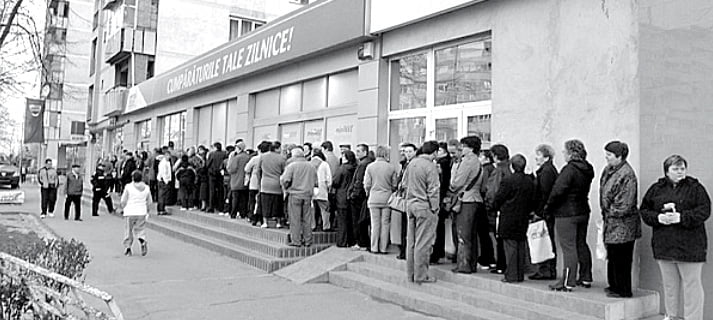I don’t remember my first Charlie Chaplain movie, but I do remember watching it with my parents and being happy that I could understand it even though it wasn’t dubbed. We still watch Chaplain movies, our personal favorite is “The Kid,” and every time my parents tell me how much these movies made them laugh when they were growing up. This may not seem like a big deal, except my parents grew up in communist Romania, and I was lucky to have been born a few years after the Romanian Revolution. When I was a kid, the Tramp helped them tell me their stories about life in an oppressive regime through comedy.

“The Great Dictator” (1940)
For my parents, the Tramp’s endless quest for his next meal struck home in a time of severe rationing and actual bread lines. To this day, my parents hate pasta because grocery stores would be filled with aisles on aisles of pasta and canned fish…and nothing else. Electricity and running water were never a given; if anything was certain, it was that the water would run out or the lights would turn off exactly when you needed them most. (I should also mention that they lived in the capital city, Bucharest, not some tiny Transylvanian village.) The shantytown houses Charlie would sometimes live in looked a lot like the poor village homes you can still see in rural Romania today, torn, tattered, and falling apart. And while most people identified Adenoid Hynkel with Adolf Hitler, my parents could sneak a giggle at how much he resembled Nicolai Ceaușescu without incurring the wrath of the Secret Police (if you don’t believe me, here’s Hynkel, and here’s Ceaușescu).

Lines at the grocery store in Communist Romania.
How do you explain poverty and political oppression to a 6-year-old girl? Show her a Tramp who would rather go to jail for a hot meal than be homeless. Show her a dictator who speaks in understandable gibberish. Let her laugh, because she is too young to understand how tragic it is when these situations are real.
I know these blog posts are supposed to be more research-oriented, but two points were brought up in class that literally struck home for me. The first was that Chaplain believed silent movies were more universal. I think he should have been less modest and insisted that HIS silent movies are more universal. The Tramp became a symbol of resilience in communist Romania, somebody who was staring into the face of poverty and still finding reasons to laugh. Because his comedy was all transmitted through his body and his facial expressions, his movies were incredibly easy to understand. His use of universal themes, like hunger and societal oppression, also made the movies translatable.

Ceaușescu giving a speech in 1967. He was the dictator of Romania until 1989.
Another point we brought up in class is the ability of comedy to reflect on social issues. To be fair, “The Great Dictator” would undoubtedly have been banned in my country if it weren’t a blatant satire of Nazi Germany. Still, it struck the hearts of a people who were tired of hearing the ruthless leader of their country screaming on the TV for an hour every week about how rich Romania was when everyone was miserable and starving. Chaplain gave them a way to express their criticisms and frustrations with the oppressive regime.
In that vein, we also mentioned in class how comedy is a fine line away from tragedy, as noted in the roller skating scene of “Modern Times.” One step over the edge turns laughter into tears. For my parents, that ledge was moving from the movies back to reality. But at least the movies gave them a chance to laugh.
